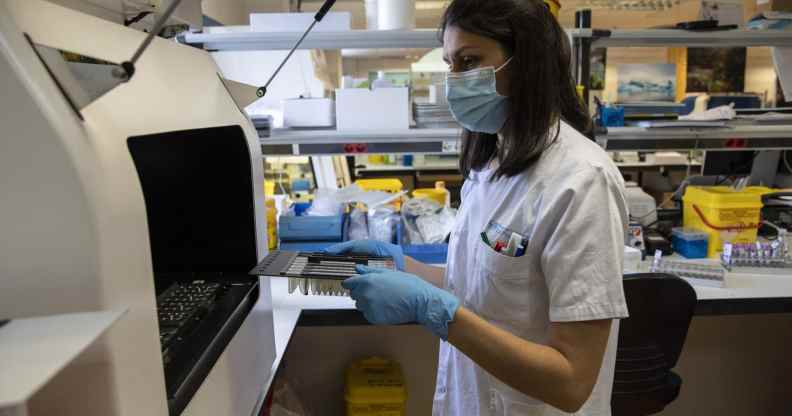Monkeypox: 90-minute PCR test developed as UK cases surge past 1,000

Monkeypox cases continue to soar around the world. (Pablo Blazquez Dominguez/Getty Images)
Scientists have developed a fairly quick and cheap test to diagnose monkeypox as cases in the UK surge to more than 1,000.
South Korean test manufacturer Seegene announced Tuesday (28 June) that it had developed a polymerase chain reaction, or PCR, test for monkeypox.
With just a $12 price tag, the Novaplex MPXV Assay can identify a positive monkeypox result in 90 minutes, Seegene says.
The test will be given to all countries currently grappling with the once-rare virus, which has spread across Europe, the Americas and more, the World Health Organisation says.
“The monkeypox virus outbreak shows that endemic viruses can rapidly spread to the rest of the world and it’s a warning that new pandemics can emerge and threaten our lives at any time,” said Dr Jong-Yoon Chun, CEO of Seegene, in a statement.
“We will continue our efforts to develop products that can accurately diagnose any virus to help prevent new infectious diseases from taking hold and becoming a pandemic.”
Seegene developed the test with the company’s Seegene Digitalized Development System, an AI-based automated test development system.
Monkeypox, named after being discovered in laboratory test monkeys, is usually tested by taking a swab from the virus’ hallmark symptoms – open sores and blisters. But tests can still be difficult to get a hold of and not all patients report the same symptoms.

Monkeypox continues to be record high numbers. (Credit: CDC/Getty Images)
Cases in the UK continue to climb. Since the first case of the outbreak was confirmed in May, monkeypox has since infected 1,076 people, the UK Health Security Agency (UKHSR) said Monday.
Heath officials said of the laboratory-confirmed cases, 1,035 were in England, nine were in Wales, 27 were in Scotland and five were in Northern Ireland.
The highest proportion of cases nationwide have been known among London residents. Of the 833 patients with a known address, 659 lived in the capital.
In the global outbreak of monkeypox, many cases have clustered around gay and bisexual men and men who have sex with men, the UKHSA says.
During a technical briefing on 10 June, the UKHSA said of 321 monkeypox patients surveyed by the agency, some 96 per cent said they were gay or bisexual.
Health officials have been at pains to stress that, no, monkeypox is not a “gay disease” nor is it known to be a sexually-transmitted disease. Everyone regardless of sexuality should be on the lookout for symptoms.
Monkeypox symptoms start off much like the common cold, such as a fever, body aches or swollen glands, before a rash forms on the body with flat red marks. They soon become raised and filled with pus, the NHS says.
The mild virus has been circulating in western and central Africa for years and tends to jump from person to person through close physical contact, which can include body fluids, skin contact and respiratory droplets.
After exposure, symptoms typically appear in six to 13 days but can take as long as 13 days.

